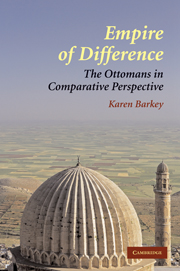Book contents
- Frontmatter
- Contents
- Preface
- Transliterations
- PART I AN IMPERIAL MODEL
- 1 Introduction
- 2 Emergence: Brokerage across Networks
- 3 Becoming an Empire: Imperial Institutions and Control
- 4 Maintaining Empire: An Expression of Tolerance
- 5 The Social Organization of Dissent
- PART II THE TRANSFORMATION OF THE EIGHTEENTH CENTURY
- Bibliography
- Index
- References
1 - Introduction
Published online by Cambridge University Press: 05 September 2012
- Frontmatter
- Contents
- Preface
- Transliterations
- PART I AN IMPERIAL MODEL
- 1 Introduction
- 2 Emergence: Brokerage across Networks
- 3 Becoming an Empire: Imperial Institutions and Control
- 4 Maintaining Empire: An Expression of Tolerance
- 5 The Social Organization of Dissent
- PART II THE TRANSFORMATION OF THE EIGHTEENTH CENTURY
- Bibliography
- Index
- References
Summary
When Mahmud II peacefully closed his eyes in his sister's Çamlıca Palace on 30 June 1839, he had successfully shepherded his empire, its institutions, and its diverse peoples toward the road that would ultimately lead “out of empire.” A staunch believer in the westernization of Ottoman political thought, culture, and institutions, he had engineered a series of reforms that culminated in the famous Tanzimat reorganization, a program that would make the empire look more like a Western nation-state. Unfortunately, the reality on the ground was far from national. From the demography of the empire, the ethnic and religious mixes, and imperial ways – from the unwarranted violence of petty officials to the lenient and sometimes negligent deal making of the imperial ruling elites – to the half-hearted recognition of the importance of territory and frontiers, most indicators of social and political life were redolent of empire. What ensued was a race against time. Although without knowledge of what was to come – the watershed event of World War I – Ottomans engaged in a race to combine “saving the empire” with “becoming a modern nation.” It is in this contradictory duality that the Ottomans lost their empire and the best of what they possessed: their diversity, ingenious flexibility, and resiliency.
At a time when we ask ourselves how to forge long-lasting political and economic cohesion in the midst of ethnic and national diversity on a multinational scale, the current fascination with the study of empire is understandable.
- Type
- Chapter
- Information
- Empire of DifferenceThe Ottomans in Comparative Perspective, pp. 3 - 27Publisher: Cambridge University PressPrint publication year: 2008



